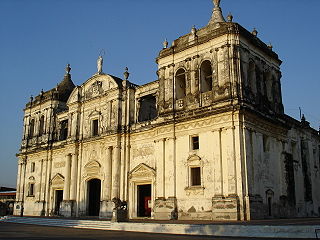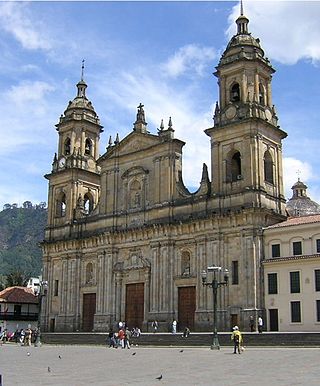Human rights in Cuba are under the scrutiny of human rights organizations, which accuse the Cuban government of committing systematic human rights abuses against the Cuban people, including arbitrary imprisonment and unfair trials. International human rights organizations such as Amnesty International and Human Rights Watch have drawn attention to the actions of the human rights movement and designated members of it as prisoners of conscience, such as Óscar Elías Biscet. In addition, the International Committee for Democracy in Cuba led by former statesmen Václav Havel of the Czech Republic, José María Aznar of Spain and Patricio Aylwin of Chile was created to support the Cuban dissident movement.

State atheism or atheist state is the incorporation of hard atheism or non-theism into political regimes. It is considered the opposite of theocracy and may also refer to large-scale secularization attempts by governments. To some extent, it is a religion-state relationship that is usually ideologically linked to irreligion and the promotion of irreligion or atheism. State atheism may refer to a government's promotion of anti-clericalism, which opposes religious institutional power and influence in all aspects of public and political life, including the involvement of religion in the everyday life of the citizen. In some instances, religious symbols and public practices that were once held by religions were replaced with secularized versions of them. State atheism in these cases is considered as not being politically neutral toward religion, and therefore it is often considered non-secular.

The Catholic Church is "the Catholic Communion of Churches, both Roman and Eastern, or Oriental, that are in full communion with the Bishop of Rome ." The church is also known by members as the People of God, the Body of Christ, the "Temple of the Holy Spirit", among other names. According to Vatican II's Gaudium et spes, the "church has but one sole purpose–that the kingdom of God may come and the salvation of the human race may be accomplished."
Armando Valladares Perez is a Cuban-American poet, diplomat and former political prisoner for his involvement in the Cuban dissident movement.

Religion in Egypt controls many aspects of social life and is endorsed by law. The state religion of Egypt is Islam, although estimates vary greatly in the absence of official statistics. Since the 2006 census religion has been excluded, and thus available statistics are estimates made by religious and non-governmental agencies. The country is majority Sunni Muslim, with the next largest religious group being Coptic Orthodox Christians. The exact numbers are subject to controversy, with Christians alleging that they have been systemically under-counted in existing censuses.

The Catholic Church in Nicaragua is the Nicaraguan part of the worldwide Catholic Church, under the spiritual leadership of the Pope, curia in Rome, and the Conference of Nicaraguan Bishops.
Christianity is the most widely professed religion in Cuba, with Catholicism being its largest denomination. A significant share of the Cuban population is either non-religious or practices folk religions.

Rosemary Radford Ruether was an American feminist scholar and Roman Catholic theologian known for her significant contributions to the fields of feminist theology and ecofeminist theology. Her teaching and her writings helped establish these areas of theology as distinct fields of study; she is recognized as one of the first scholars to bring women's perspectives on Christian theology into mainstream academic discourse. She was active in the civil rights movement in the 1960s, and her own work was influenced by liberation and black theologies. She taught at Howard University for ten years, and later at Garrett-Evangelical Theological Seminary. Over the course of her career, she wrote on a wide range of topics, including antisemitism, the Israeli–Palestinian conflict, the intersection of feminism and Christianity, and the climate crisis.

Religion in Nicaragua is predominantly Christian and forms a significant part of the culture of the country as well as its constitution. Religious freedom and religious tolerance is promoted by the Nicaraguan constitution yet the government has in recent years detained, imprisoned, and likely tortured numerous Catholic leaders, according to multiple news outlets. As of 2020, 79% of believers stated they are Christian.

Christianity has played an important role in Cuba's history. Cuba was discovered by Christopher Columbus a few days after he arrived to the New World in 1492. In 1511, colonization began when the Conquistador Diego Velázquez de Cuéllar established the Catholic Church in Cuba with the early priest Fray Bartolomé de las Casas known commonly as "the Protector of the Indians". Along with Catholicism, Protestantism came during the same time.

Christianity is the most prevalent religion in the United States. Estimates from 2021 suggest that of the entire U.S. population about 63% is Christian. The majority of Christian Americans are Protestant Christians, though there are also significant numbers of American Roman Catholics and other Christian denominations such as The Church of Jesus Christ of Latter-day Saints, Orthodox Christians and Oriental Orthodox Christians, and Jehovah's Witnesses. The United States has the largest Christian population in the world and, more specifically, the largest Protestant population in the world, with nearly 210 million Christians and, as of 2021, over 140 million people affiliated with Protestant churches, although other countries have higher percentages of Christians among their populations. The Public Religion Research Institute's "2020 Census of American Religion", carried out between 2014 and 2020, showed that 70% of Americans identified as Christian during this seven-year interval. In a 2020 survey by the Pew Research Center, 65% of adults in the United States identified themselves as Christians. They were 75% in 2015, 70.6% in 2014, 78% in 2012, 81.6% in 2001, and 85% in 1990. About 62% of those polled claim to be members of a church congregation.

Religion in Colombia is dominated by various branches of Christianity and is an expression of the different influences in the Colombian culture including the Spanish, the Native Amerindian and the Afro-Colombian, among others.
Religion in Iran has been shaped by multiple religions and sects over the course of the country's history. Zoroastrianism was the main followed religion during the Achaemenid Empire, Parthian Empire, and Sasanian Empire. Another Iranian religion known as Manichaeanism was present in Iran during this period. Jewish and Christian communities thrived, especially in the territories of northwestern, western, and southern Iran—mainly Caucasian Albania, Asoristan, Persian Armenia, and Caucasian Iberia. A significant number of Iranian peoples also adhered to Buddhism in what was then eastern Iran, such as the regions of Bactria and Sogdia.

Haiti is a majority Christian country. For much of its history and up to the present day, Haiti has been prevailingly a Christian country, primarily Roman Catholic, although in practice often profoundly modified and influenced through syncretism. A common syncretic religion is Vodou, which combined the Yoruba religion of enslaved Africans with Catholicism and some Native American strands; it shows similarities, and shares many deity-saints, with Cuban Santería and Brazilian Candomblé. The constitution of Haiti establishes the freedom of religion and does not establish a state religion, although the Catholic Church receives some preferential treatment.
The term New Atheism describes the positions of some atheist academics, writers, scientists, and philosophers of the 20th and 21st centuries. New Atheism advocates the view that superstition, religion, and irrationalism should not simply be tolerated. Instead, they advocate the antitheist view that the various forms of theism should be criticised, countered, examined, and challenged by rational argument, especially when they exert strong influence on the broader society, such as in government, education, and politics. Major figures of New Atheism include Richard Dawkins, Sam Harris, Christopher Hitchens and Daniel Dennett, collectively referred to as the "Four Horsemen" of the movement, as well as Ayaan Hirsi Ali until her conversion to Christianity in 2023.

Protestantism is a branch of Christianity that emphasizes justification by God through faith alone, the teaching that salvation comes by unmerited divine grace, the priesthood of all believers, and the Bible as the sole infallible source of authority for Christian faith and practice. The five solae summarize the basic theological beliefs of mainstream Protestantism.
Victor Andres Triay is a Cuban American historian and writer, known for the books Fleeing Castro: Operation Pedro Pan and the Cuban Children’s Program, Bay of Pigs: An Oral History of Brigade 2506, The Unbroken Circle, and The Mariel Boatlift: A Cuban American Journey.

Cuba–Holy See relations are foreign relations between the Holy See and the Republic of Cuba.

María Elvira Salazar is an American journalist, author, and politician serving as the U.S. representative for Florida's 27th congressional district. She is a Republican assistant whip. Before entering politics, Salazar worked for the Spanish-language network Telemundo for three decades after serving as a news anchor for Miami-based WSBS TV. She has also worked for CNN Español and Univision.
The status of religious freedom in North America varies from country to country. States can differ based on whether or not they guarantee equal treatment under law for followers of different religions, whether they establish a state religion, the extent to which religious organizations operating within the country are policed, and the extent to which religious law is used as a basis for the country's legal code.















